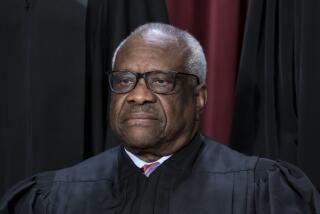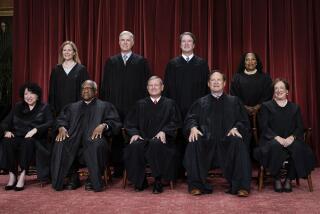Senate ethics panel admonishes Coburn over Ensign aide
- Share via
WASHINGTON — The Senate Ethics Committee publicly admonished Sen. Tom Coburn (R-Okla.) for improperly meeting with a lobbyist and former aide to Sen. John Ensign, the Nevada Republican who resigned from the Senate after having an affair with the aide’s wife.
The qualified reprimand for violating the ban on meeting with former staff-turned-lobbyists falls short of a censure or criminal violation. But the committee said it was “improper conduct” for Coburn to meet with Douglas Hampton, the former aide who tried to work as a lobbyist after the affair forced him out of Ensign’s office.
The Senate has a one-year prohibition on senior staff seeking to influence their former colleagues, and the ethics committee previously accused Ensign of conspiring to violate the ban by helping to set up clients for Hampton. The rule was set as a way to shut the revolving door between lobbyists and Capitol Hill.
“Senators are obligated to meet a high standard,” the committee wrote in a letter signed by all six members of the panel, which is equally represented by Democrats and Republicans.
The committee also admonished Bret Bernhardt, the chief of staff to Sen. Jim DeMint (R-S.C.), for meeting with Hampton and arranging a meeting with DeMint.
A statement from Coburn’s office called the admonishment “gratuitous,” noting that Coburn had cooperated fully with the committee’s investigation and that Hampton had been just seven weeks shy of clearing the cooling-off period.
“It is unfortunate the committee has impugned Dr. Coburn for their failure to provide workable guidance for a law that was passed nearly five years ago,” said Coburn communications director John Hart.
DeMint’s office stood by Bernhardt as a respected senior staff member who “continues to serve with honor and integrity,” said DeMint spokesman Wesley Denton.
Ensign’s nearly yearlong affair and its fallout ricocheted across Washington, resulting in a Justice Department investigation — and ultimately Ensign’s decision last year to resign from office.
Once Ensign in 2009 disclosed the affair with Cynthia Hampton, who had also worked for him at his campaign office but had since left his employment, Douglas Hampton acknowledged having lobbied his former Senate colleagues as he tried to get new work — a violation of the one-year ban.
Hampton was indicted by federal prosecutors on charges related to the revolving-door lobbyist ban, but has reportedly reached a plea agreement in advance of a trial scheduled for this year, according to Las Vegas newspapers.
As the affair was unfolding, Coburn played a pivotal role, offering personal counsel to both men. Coburn lived with Ensign and other Christian conservative members of Congress in the building known as the C Street house, where men often hold prayer meetings.
In Friday’s letter, the committee noted that Coburn and Bernhardt had personal relationships with Hampton and thus would have understood his status would violate the ban. Bernhardt and Hampton had occasionally met for Bible study.
Senate investigators looked at an array of events around the affair, including the decision by Ensign’s parents to give the Hamptons and their children nearly $100,000 when the couple left the senator’s employment.
Days before Ensign was scheduled to appear before the ethics committee, he resigned.
The committee’s action is expected to be its last in the case.
More to Read
Sign up for Essential California
The most important California stories and recommendations in your inbox every morning.
You may occasionally receive promotional content from the Los Angeles Times.














